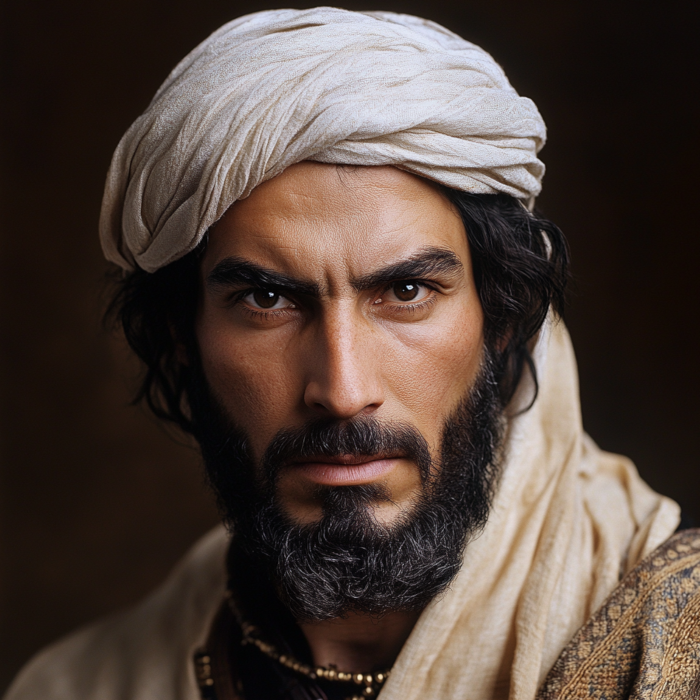


Ibn Battuta (1304–circa 1369) was a Moroccan scholar, jurist, and explorer who is widely regarded as one of the greatest travelers in history. Over the course of nearly three decades, he journeyed across much of the known world, covering around 75,000 miles and visiting regions that include North Africa, the Middle East, Central Asia, South Asia, Southeast Asia, and China. His extensive travels were recorded in a famous travelogue known as the Rihla ("The Journey"), which provides invaluable insights into the cultures, geography, and societies of the 14th century.
The Hajj and Beyond: After completing the Hajj, Ibn Battuta decided to continue his travels rather than return home. He journeyed through much of the Islamic world, motivated by a desire to explore, seek knowledge, and meet prominent scholars and rulers of the time. His travels took him through North Africa, Egypt, the Arabian Peninsula, and the Levant.
The Islamic World: During his travels, Ibn Battuta visited many of the major centers of Islamic civilization, including Cairo, Damascus, Baghdad, and Constantinople (now Istanbul). He spent time in Mamluk Egypt, where he marveled at the bustling trade and magnificent architecture. In the Levant, he visited Jerusalem, Hebron, and other holy cities. His observations of Islamic culture, architecture, and governance provide a valuable historical record of the 14th-century Muslim world.
India and the Delhi Sultanate: One of the most significant phases of Ibn Battuta's travels was his journey to India in 1333. He arrived at the court of Sultan Muhammad bin Tughluq of the Delhi Sultanate, who appointed him as a qadi (Islamic judge). Ibn Battuta served in this capacity for several years and was later sent by the sultan as an ambassador to the Mongol court in China. His account of life in India under the Delhi Sultanate provides a detailed description of the region's politics, society, and culture.
Southeast Asia and China: Ibn Battuta's travels also took him to the Maldives, Sri Lanka, and Southeast Asia, including Sumatra (part of modern Indonesia). He eventually reached China, where he visited Guangzhou (then known as Canton) and other cities. His observations of Chinese culture, trade, and governance are among the earliest recorded by a Muslim traveler.
West Africa: After years of traveling in the East, Ibn Battuta returned to North Africa. In 1352, he embarked on a journey to the West African kingdom of Mali. He visited the city of Timbuktu and the court of Mansa Musa's successor, Mansa Suleyman. His account of Mali provides one of the earliest descriptions of this prosperous and powerful West African empire.
Commissioning of the Rihla: Upon his return to Morocco around 1354, Ibn Battuta was invited by the Sultan of Morocco, Abu Inan Faris, to recount his travels. The sultan commissioned a scholar named Ibn Juzayy to record Ibn Battuta's experiences in what became known as the Rihla ("The Journey"). The Rihla is both a travelogue and a work of literature, combining personal narrative with descriptions of the places Ibn Battuta visited.
Content of the Rihla: The Rihla provides a comprehensive account of Ibn Battuta's travels, offering insights into the cultures, geography, and social structures of the regions he visited. It includes detailed descriptions of cities, mosques, markets, and palaces, as well as accounts of the people he met, their customs, and their religious practices. The Rihla is also an important source of information on the Islamic world in the 14th century, reflecting the diversity and interconnectedness of the Muslim world at that time.
Historical Significance: The Rihla is considered one of the most important travelogues of the medieval period. It offers a unique perspective on the world from the viewpoint of a Muslim scholar and traveler. Although some aspects of the narrative have been questioned for their accuracy or exaggeration, the work remains a vital source of historical and cultural information.
Impact on Geography and History: Ibn Battuta's Rihla had a significant impact on the study of geography and history. His detailed observations and descriptions of distant lands contributed to a greater understanding of the world beyond the boundaries of the Islamic world. His work influenced later explorers and geographers, and it remains a key text in the study of medieval history and Islamic civilization.
Recognition in the Modern Era: Although Ibn Battuta was relatively unknown in the Western world until the 19th century, his travels have since been recognized for their historical importance. Today, he is celebrated as one of history's greatest travelers, and his legacy continues to inspire scholars, historians, and travelers alike.
Cultural and Educational Influence: Ibn Battuta's life and travels have inspired various cultural and educational initiatives. His journeys are the subject of numerous books, documentaries, and academic studies. In the Arab and Muslim worlds, he is regarded as a symbol of intellectual curiosity, exploration, and the quest for knowledge.
Later Life: After completing his travels and dictating the Rihla, Ibn Battuta is believed to have spent his later years in Morocco. Little is known about his life after the completion of the Rihla, and the exact date and circumstances of his death are uncertain. He is thought to have died around 1369.
Resting Place: The location of Ibn Battuta's tomb is not definitively known, although it is commonly believed that he was buried in his hometown of Tangier.
Ibn Battuta's life and travels stand as a remarkable testament to the spirit of exploration and the pursuit of knowledge. His journeys across the Islamic world and beyond provide an invaluable record of the 14th-century world, bridging cultures and regions through his observations and writings. As one of history's greatest travelers, Ibn Battuta's legacy continues to be celebrated for its contributions to geography, history, and cultural understanding.

We use cookies
We use cookies and other tracking technologies to improve your browsing experience on our website, to show you personalized content and targeted ads, to analyze our website traffic, and to understand where our visitors are coming from. Privacy Policy.